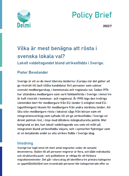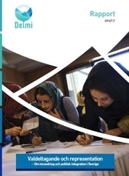The Policy Brief analyses Swedish administrative data that, in combination with institutional conditions, have created a quasi-random distribution of voting rights, i.e. the variation of immigrants' immigration dates. It examines the net effect for three groups of immigrants. This is based on the standard of living in the countries of origin, which differ in how they react to the opportunity to participate in the democratic process in Sweden.
Some overall conclusions and recommendations
- A key finding is that the propensity to acquire citizenship varies between different migrant groups.
- For migrants from less developed countries (low HDI), we find that the experience of gaining voting rights as a non-citizen significantly increases the motivation to acquire Swedish citizenship and become a Swedish citizen.
- The reverse is true for migrants from more developed countries, i.e. they do not apply for Swedish citizenship to the same extent.
- One conclusion is that more studies are needed to understand how the motivating factors strengthen the desire to acquire citizenship, as well as how they can weaken it. But future studies should also highlight other aspects of immigrants' right to vote.
About the authors
Pieter Bevelander is a Professor of International Migration and Ethnic Relations (IMER) at Malmö University and Director of the Malmö Institute for Studies of Migration, Diversity and Welfare (MIM).
Michaela Slotwinski is a Senior Researcher and Deputy Head of the ZEW research group "Inequality and Public Policy". She holds a PhD from the University of Basel in Switzerland.
Alois Stutzer is Professor of Political Economy in the Faculty of Business Administration at the University of Basel, Switzerland. He studied economics at the University of Zurich and obtained his PhD in economics in 2001.
Publication date: 14 November 2023
Photo: Valmyndigheten


